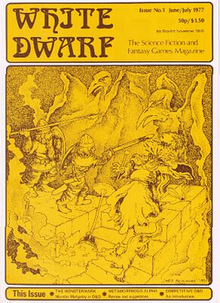White Dwarf magazine

Cover of White Dwarf issue 1, June/July 1977
|
|
| Editor | Jes Bickham |
|---|---|
| Categories | Wargames |
| Frequency | Monthly |
| First issue | June/July 1977 |
| Company | Games Workshop |
| Country | United Kingdom |
| Website | www.games-workshop.com |
| ISSN | 0265-8712 |
White Dwarf is a magazine published by British games manufacturer Games Workshop, which has long served as a promotions and advertising platform for Games Workshop and Citadel Miniatures products.
During the first ten years of its publication, it covered a wide variety of fantasy and science-fiction role-playing games (RPGs) and board games, particularly the role playing games Advanced Dungeons & Dragons (AD&D), RuneQuest and Traveller (which were all published by other games companies, but distributed by Games Workshop stores in this era). The magazine underwent a major change in style and content in the late 1980s and is now dedicated exclusively to the miniature wargames produced by Games Workshop.
Steve Jackson and Ian Livingstone initially produced a newsletter called Owl and Weasel, which ran for twenty-five issues from February 1975 before it evolved into White Dwarf.
Originally scheduled for May/June 1977 but first published one month later on a bimonthly schedule with an initial (and speculative) print run of 4,000, White Dwarf continued the fantasy and science fiction role-playing and board-gaming theme developed in Owl and Weasel but, owing to the increase in available space, began to produce reviews, articles and scenarios to a greater depth than had previously been possible.
During the early 1980s the magazine focused mainly in the 'big three' role playing games of the time: AD&D, RuneQuest and Traveller.
In addition to this a generation of writers passed through its offices and onto other RPG projects in the next decade, such as Phil Masters and Marcus L. Rowland. One huge attraction of the magazine was its incorporation of mini-game scenarios, capable of completion in a single night's play, rather than the mega-marathon games typical of the off the shelf campaigns. This would often be in the form of an attractive and interesting single task for either existing or new characters to resolve. These could either be slipped into existing campaign plots, or be used stand-alone, just for a fun evening, and were easily grasped by those familiar with RPG rules.
...
Wikipedia
